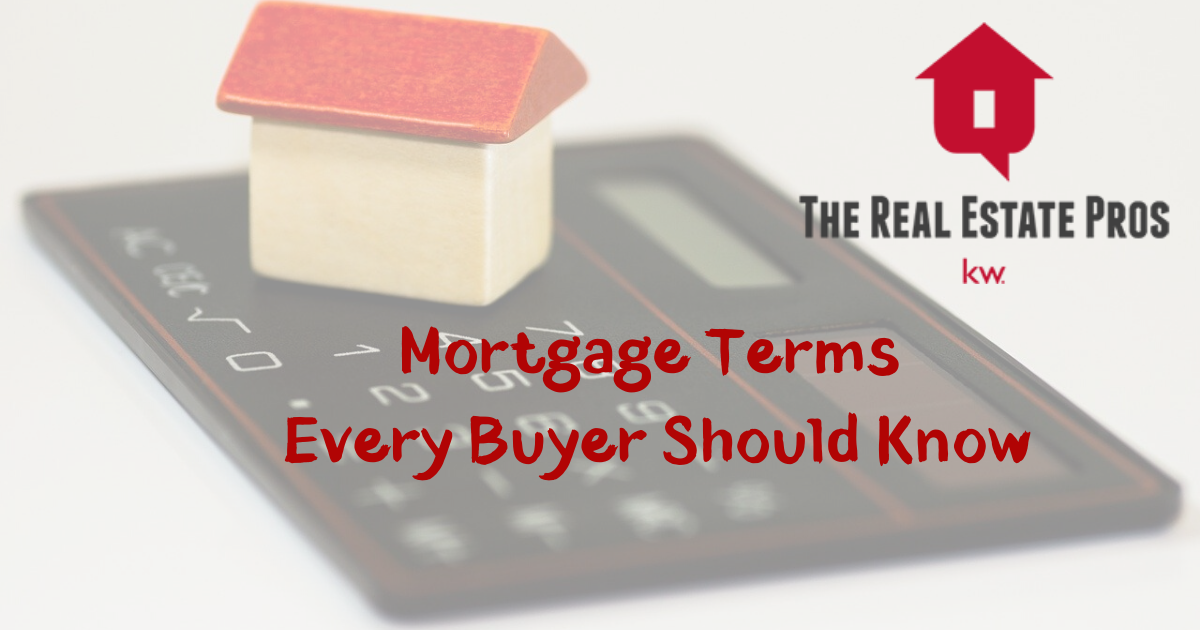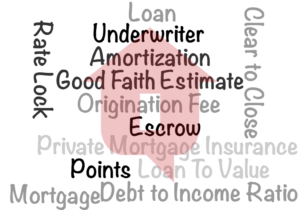
Home Mortgage Terms You Should Know
The mortgage industry has a lingo unique to it. The more you know the home mortgage terms, the better off you are when talking with lenders.
Below is a list of the most common terms. While we aren’t loan officers, we do understand these terms and encourage you to speak with your Loan Office about anything you don’t understand!
Home Mortgage Terms

Amortization
The amortization of your loan is a breakdown of all the payments you make during the life of the loan and how much goes towards interest and principal.
For example, if you had a mortgage loan for $200,000 for 30 years at 4.5% interest, the payment would be $1,013.37. The Amortization of your loan would show for the first payment, $263.37 will go toward paying down the principal and the other $750, will go toward the interest.
Each time you make a payment, more money is allocated toward principal and less toward interest. You will receive an amortization schedule with your mortgage loan.
Closing Disclosure
A Closing Disclosure is typically about 5 pages long and provides the final details about the mortgage loan you have selected. Monthly payments, loan terms, fees and other mortgage costs are included.
This is the form you have to acknowledge/sign for the mandatory 3 day TRID waiting period to start.
Debt to Income Ratio - DTI
The Debt to Income ratio (or DTI) is a ratio that tells the lender your likelihood of being able to make the mortgage payments. They compare the monthly mortgage payments and household expenses to the monthly income of the borrow.
The lower the percentage, the more comfortable the payment is for the buyer. They higher the percentage, the riskier it is for the lender to recover the loan.
Escrow
At closing, the borrowers are generally required to set aside a percentage of the yearly property taxes to be held by the lender. The lender can also escrow the home owners insurance. On a monthly basis in your mortgage payment, these funds are “escrowed and held by the lender in an escrow account maintained by the lender. The property taxes and/or insurance are paid by the lender when due from this escrow account.
Good Faith Estimate
A Good Faith Estimate is given to you by your lender. It includes an estimate of the costs and fees to close then mortgage loan. It is not an exact amount, however, it is a way for lenders to inform buyers of what is needed from them at the time of closing of the loan. The certain items on the GFE can only change by a certain amount between the GFE and the Closing Disclosure.
Loan to Value (Ratio)
Loan to Value (LTV) represents how much you are borrowing (or own through paid equity) as a percent of your homes’ appraised value.
For a new purchase for instance, if your mortgage loan is for $200,000 and the appraised value is $225,000 then your loan to value ratio is 88.9% or your loan represents 88.9% of your homes’ value.
To figure the LTV of your current home, say the market value is $250,000 and you owe $175,000 on your mortgage loan. Then your LTV is 70%. In other words, you have 30% equity in your home.
The higher the LTV percent, the riskier the loan for the lender because you have less equity in the home.
Origination Fee
When you apply for a mortgage loan, you are often required to pay an origination fee to your lender. This fee may include an application fee, appraisal fee, fees for all the follow-up work and other costs associated with the loan.
PMI (Private Mortgage Insurance)
PMI or Private Mortgage Insurance is very important among home mortgage terms. It is a type of insurance mortgage lenders require when a borrower puts less than 20 percent down on the home.
It protects the lender in case the borrower defaults on the loan. Since the borrower will have less than 20% equity in the property, PMI offsets the lender’s risk.
It also is a way you can become a homeowner with less than a 20% down payment.
Once you’ve reached the 20% equity mark – whether by paying down the loan or if your homes value has risen – you can contact your lender about removing the PMI portion of your loan payment.
Points (or Basis Points)
A point or basis point in the mortgage industry is one one-hundredth of a person or 0.01 percent. So, one hundred basis points is one percent.
Some borrowers, in order to get a lower interest rate, will pay points to lower or “buy down” the interest rate a lender offers.
Paying a percentage point up front in order to get a lower rate will eventually be a saving to borrowers in the long run if they stay in the house for the duration of the loan. If they move shortly after buying the property then they will likely lose money buying points.
Rate Lock
A rate lock for a mortgage loan is an agreement between a borrower and a lender to lock in the interest rate on a mortgage for a specified time period at the prevailing market interest rate – regardless of whether the rate goes up or down on the open market.
Usually, if there is a delay in closing, a lender will allow the borrower to pay an extension fee for a short period of time – hopefully until the loan closes.
The lender may also charge a lock fee, which the borrower must pay if he/she/they do not lock in their interest rate.
Underwriter
Mortgage underwriters conduct a thorough risk assessment of the borrower during the mortgage loan process. They review income, credit report, credit score, debt-to-income ratio and more to decide if a borrower is a good risk to repay the mortgage.
Additionally, underwriters assess the value of the property the borrower is wanting to buy. They do this through ordering an appraisal. This helps determine if the mortgage terms are fair for both the lender and the borrower.
The underwriter is the one who will give the Clear to Close on a loan. They can also deny the loan or approve it with conditions that must be met prior to closing on the property/mortgage.
Knowing the Meaning of Terms
Knowing these basic home mortgage terms can help you be better prepared to talk with a lender and choose the one who is right for you. Knowledge is power! You should also read “Real Estate Terms” to become familiar with other real estate terminology before buying or selling a home!
Good luck!!

